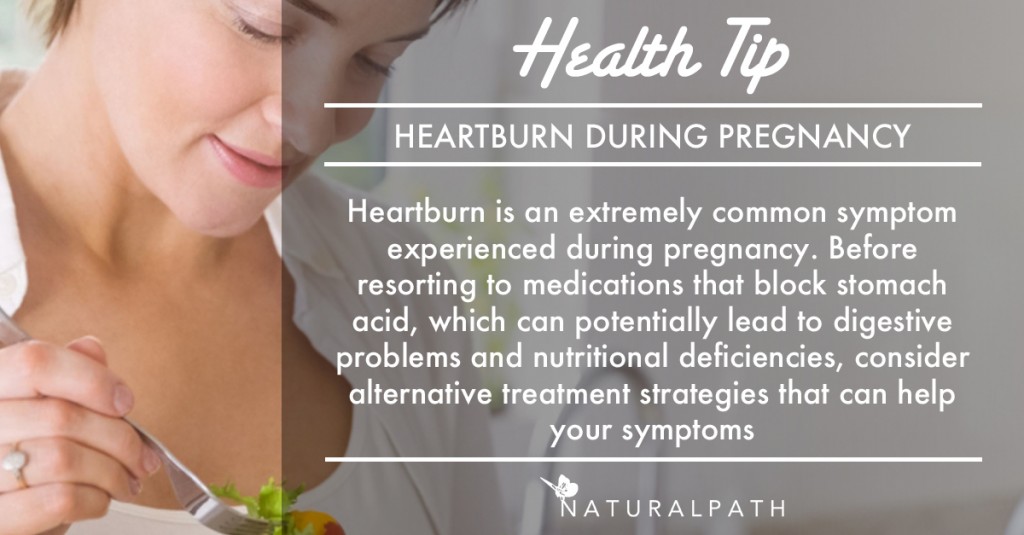Gastroesophageal reflux disease (GERD), commonly known as heartburn, is one of the most common symptoms women experience during pregnancy, with its prevalence reaching up to 80%.1,2 The reasons why this symptom is so common in pregnancy is due to increased pressure in the stomach by the growing baby, causing the sphincter between the esophagus and stomach to weaken and not properly close. Treatments for GERD tend to focus on treating excessive acid production by the stomach using common treatments such as antacids or by prescription medications such as acid blockers called proton-pump inhibitors. These medications are generally recommended as safe interventions and can provide great symptom relief to improve the quality of life of an expecting mother.2 Despite this, many women prefer a natural route to relief and as Naturopathic doctor, I always encourage treating the root cause, not just masking symptoms.
Low Stomach Acid vs. Excessive Stomach Acid
Heartburn, at times, may not be due to excessive acid production. In fact, many cases of heartburn are caused by not having enough acid. Stomach acid is naturally secreted by the stomach to break down food, and to activate enzymes for digestion within the intestines. Low stomach acid can cause symptoms of acid reflux because the esophageal sphincter that separates the esophagus and the stomach closes only once it comes into contact with a certain level (pH) of acid. If that acid level isn’t reached, it does not signal the sphincter to close, allowing food that has been slightly acidified to reflux back up the esophagus causing burning. Low stomach acid inefficiently breaks down food contents in the stomach causing bloating, cramping, and overall indigestion. For these reasons, long-term use of medications that block stomach acid may temporarily relieve symptoms, but weaken digestion over time. Low stomach acid (hypochlorhydria or achlorhydria) can impede the body from attaining essential nutrients from food, such as Vitamin B12, iron, and magnesium, and can make one susceptible to bacteria infections of the stomach.2-4 Causes for low stomach acid (not caused by medications) can be due to irregular eating habits, stress, poor dietary choices, and drinking a substantial amount of water while eating.
How Can I Tell if I have Low or Excessive Stomach Acid?
The differences between reflux due to low and excessive stomach acid are difficult to discriminate as they both have very similar symptom profiles There are differences I see in practice – excessive acid tends to be extremely painful burning that tends to be triggered by both small snacks and larger meals. You almost get immediate relief taking antacids or drinking cool beverages such as milk. In low stomach acid, you may only feel symptoms after eating a regular sized, or larger meal, and is typically accompanied by bloating and gas, and is not easily relieved by antacids.
Heartburn in the 3rd Trimester
Heartburn most experienced in the 3rd trimester.1 This could be due to low or excessive stomach acid, however most causes it’s likely due to pressure up against the stomach and esophagus. Treatments tend to be less effective during this stage due to more physical impairment versus functional impairment of digestion. I typically recommend using demulcents (remedies that soothe the gastrointestinal tract) to help with symptom control, especially if over the counter antacids are not effective. Sleeping with the head, and chest slightly elevated can also help with symptom relief as well as trying to maintain proper upright posture while sitting and standing (though I understand this may be hard to do with a large baby bump!)
Effective natural remedies To Relieve Heartburn
Lifestyle recommendations to help relieve heartburn include removing trigger foods (spicy foods, coffee, garlic, onions, tomatoes, cow’s dairy, refined sugar), eating on a regular schedule, consuming small, frequent meals, avoiding food 3 hours before bed, and sleeping with the head of the bed elevated. Aside from these lifestyle changes, there a few safe, effective remedies one can use to help manage symptoms.
Apple cider vinegar: If you have heartburn that is associated with bloating, gas and indigestion, apple vinegar may be the most effective and easiest solution. The way this works for low stomach acid is that this weaker acid will stimulate the production of acid in the stomach through a feed-forward mechanism, helping the stomach acid reach a pH level that is conducive to good digestion and sphincter closure. I typically recommend 1 tsp in 1 ounce of water (you can add 1/4 tsp of honey for extra soothing) before each meal. If this is too strong you can reduce it to 1/2 tsp.
Deglycerrhized Licorice (DGL) Tablets: DGL is an extract of licorice that has been “deglycyrrhized” – glycyrrhizin, a constituent in licorice that has been associated with increasing blood pressure, has been removed in order to make this tablet safe for everyone. Licorice has been used for centuries as a demulcent, providing soothing and healing through anti-inflammation of the gastrointestinal tract.5 Not only can it relieve the symptoms of heartburn but some studies have shown that it can actually kill H.pylori, a bacteria associated with the formation of stomach ulcers, and is known to thrive in low-acid conditions.5 I recommend this for anyone who suffers from either excessive or low stomach acid, or who needs symptom relief during the third trimester. You can typically find these in 400mg tablets, and taking 1 tablet 20 mins before meals is recommended. DGL is generally recognized as safe in pregnancy; however, it is important to consult with a healthcare provider before starting this therapy.6
Slippery Elm Powder: This herbal remedy acts similar to DGL as it’s meant to soothe and heal the gastrointestinal tract. It can be used as an alternative, or conjunction with DGL for this purpose and can also help with other gastrointestinal conditions such as constipation. 1 tsp after meals can help relieve burning after a meal. It is generally recognized as safe when indicated.7
There are a number of additional treatments naturopathic doctors use to help relieve heartburn symptoms. Individualized treatments include dietary plans that can rule out trigger foods, botanical and homeopathic remedies, and stress management. It’s always smart to be supervised by a qualified healthcare professional when dealing with any health concern during pregnancy.
Heartburn is an extremely common symptom experienced during pregnancy. Before resorting to medications that block stomach acid, which can potentially lead to digestive problems and nutritional deficiencies, consider alternative treatment strategies that can help your symptoms.
 Dr. Tanya Lee, N.D. received her Honours Bachelor of Science degree in Biochemistry and Biomedical Sciences from McMaster University, and was trained as a Naturopathic Doctor at the Canadian College of Naturopathic Medicine. DrLee practices full-time between two clinics located in Toronto and Milton Ontario and has been voted Milton’s favourite Naturopath in 2013 and 2014. Her primary care practice focuses on family medicine, treating a wide variety of conditions such as hormonal (endocrine) disorders, fertility, digestive problems, cardiovascular disease, diabetes, insomnia and fatigue. She has a special interest in the treatment of autoimmune diseases, paediatric and perinatal health. Tanya offers her clinical knowledge to a number of publications, including the Natural Path.
Dr. Tanya Lee, N.D. received her Honours Bachelor of Science degree in Biochemistry and Biomedical Sciences from McMaster University, and was trained as a Naturopathic Doctor at the Canadian College of Naturopathic Medicine. DrLee practices full-time between two clinics located in Toronto and Milton Ontario and has been voted Milton’s favourite Naturopath in 2013 and 2014. Her primary care practice focuses on family medicine, treating a wide variety of conditions such as hormonal (endocrine) disorders, fertility, digestive problems, cardiovascular disease, diabetes, insomnia and fatigue. She has a special interest in the treatment of autoimmune diseases, paediatric and perinatal health. Tanya offers her clinical knowledge to a number of publications, including the Natural Path.
References:
- Quartarone G. Gastroesophageal reflux in pregnancy: a systematic review on the benefit of raft forming agents. Minerva Ginecol. 2013 Oct;65(5):541-9.
- Jovasis, B editor:. Compendium of Therapeutic Choices ed 7. Ottawa, 2014, Canadian Pharmacists Association,
- Corleto VD et. al Proton pump inhibitor therapy and potential long-term harm. Curr Opin Endocrinol Diabetes Obes. 2014 Feb;21(1):3-8.
- Famularo G et. al Hypomagnesemia and proton-pump inhibitors. Expert Opin Drug Saf. 2013 Sep;12(5):709-16. doi: 10.1517/14740338.2013.809062. Epub 2013 Jun 29.
- Han YM et. al. Dietary, non-microbial intervention to prevent Helicobacter pylori-associated gastric diseases. Ann Transl Med. 2015 Jun;3(9):122
- Pizzorno, J., Murray M, editors: Textbook of Natural Medicine ed 4, St. Louis, 2013, Churchill Livingstone Elsevier.
- Bone K. Principles and Practice of Phytotherapy. Edinburgh: Churchill Livingstone, 2000.


















